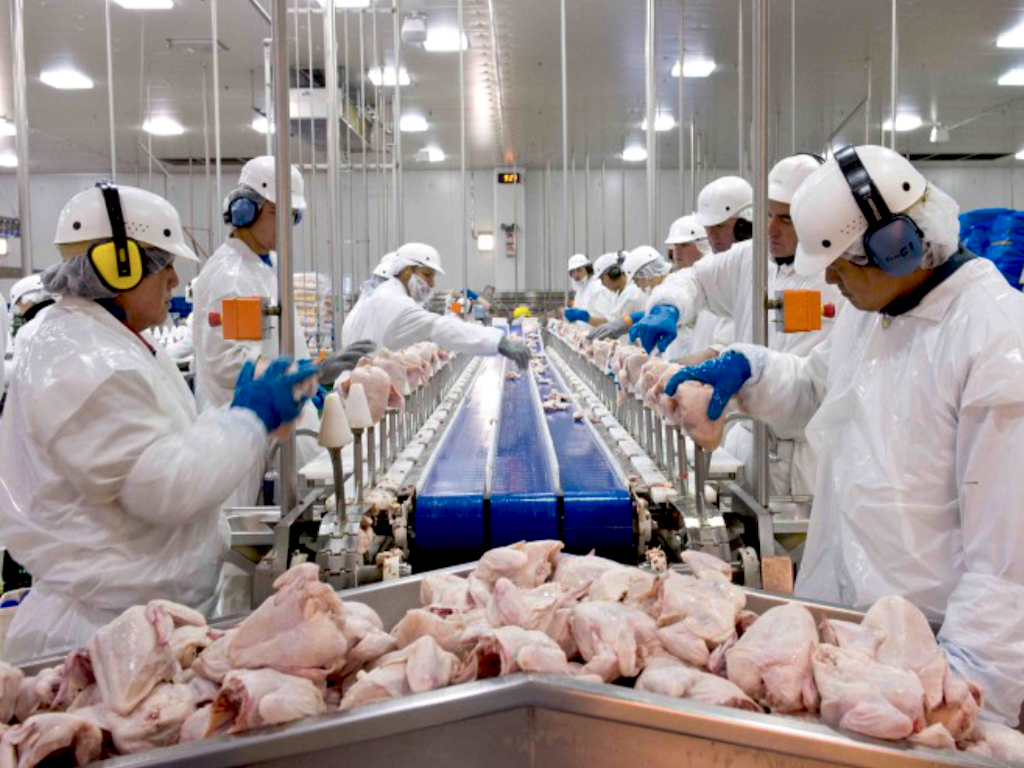3 Mins Read
A proposed new rule by the United States Department of Agriculture (USDA) will allow poultry factories to process diseased chickens and sell it for human consumption. Rolling back food safety measures in the meat industry amid the coronavirus pandemic – which scientists have linked to unsustainable and dangerous animal agriculture – could mean waiting for yet another public health disaster to erupt.
In order to prevent meat shortages and reduce the disruption the meat supply chain has faced in recent months due to slaughterhouse outbreaks, which have occurred all over the world but perhaps seen most severely in the U.S., the USDA’s Food Safety and Inspection Service (FSIS) is now allowing the sales of chicken meat made from birds with diseases.
As reported by Bloomberg, the decision comes after President Trump invoked the Defense Production Act in April to keep essential goods in production during the pandemic, which started an entire campaign to deregulate the already vulnerable and crisis-ridden meat industry.
We are dealing right now with a pandemic that transferred into humans from an animal source. Sooner or later it will mutate…A poorly regulated meat industry could very well become the source of a new epidemic.
Parthapratim Basu, former chief public health veterinarian for the FSIS
Read: Preventing another pandemic – the link between coronavirus and livestock farming
Soon after, the National Chicken Council submitted a petition to allow slaughterhouses to process birds infected with Avian Leukosis, which the USDA has now accepted. This infection causes birds to develop malignant tumours and lesions not dissimilar to cancer.
Under the new rule, inspectors will not need to examine the first 300 birds of each flock for signs of Avian Leukosis, and can simply cut the tumours off when spotted and process the rest of the birds that will end up being sold to consumers. According to the Bloomberg report, there has been some data of workers in the U.K. who have developed antibodies for the virus, indicating cross-species zoonotic transmission.
Given that the world is currently still reeling from Covid-19, a zoonotic pandemic, the timing of this ruling is the opposite of what scientists are reiterating with regards to what needs to be done to prevent yet another public health disaster.
“We are dealing right now with a pandemic that transferred into humans from an animal source,” Parthapratim Basu, former chief public health veterinarian for the FSIS, told Bloomberg. “Sooner or later it will mutate…A poorly regulated meat industry could very well become the source of a new epidemic.”
As we begin to find our way through this crisis, it is imperative for us as a society and species to focus and reflect deeply upon what this and other related human health crises are telling us about our role in these increasingly frequent events and about what we can do to avoid them in the future.
Professor David O. Wiebers, MD. & Professor Valery Feigin
The current coronavirus is only the latest in a slew of zoonotic diseases to emerge from the world’s hunger for meat, which is driving dangerous intensive factory farming. Our rising consumption of animal-based foods and agricultural intensification as a result was recently listed among the seven main causes of zoonotic pandemic emergence in a U.N. report. To date, 60% of all the 1,400 microbes known to infect humans have originated from animals.
“Intensive confinement of animals in factory farm operations should be discontinued worldwide for the sake of animals, humans, and the environment,” said David O. Wiebers, MD., emeritus professor at the Mayo Clinic and Valery Feigin, neuroscience professor at Auckland University of Technology in a recent warning of the need to move away from an animal-based food system.
“As we begin to find our way through this crisis, it is imperative for us as a society and species to focus and reflect deeply upon what this and other related human health crises are telling us about our role in these increasingly frequent events and about what we can do to avoid them in the future.”
Lead image courtesy of Tyson Foods.




